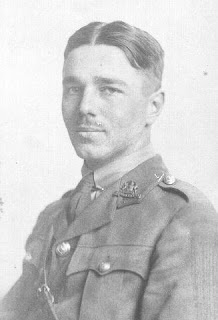 It's a wet, grey afternoon and undeniably streaked with autumn. And perhaps a suitably melancholic moment to remember that I've been meaning to write a line or two about Wilfred Owen.
It's a wet, grey afternoon and undeniably streaked with autumn. And perhaps a suitably melancholic moment to remember that I've been meaning to write a line or two about Wilfred Owen.This all started when someone called Pam contacted me about a new memorial to Britain's finest First World War poet, who famously was killed only a week before the end of the war.
Owen spent his last nights and wrote his final letters, notably to his mother, in the cellar of la Maison Forestière or Forester's House in the village of Ors, 35km from Cambrai, in the département du Nord, which borders with Belgium. Owen is buried in the village.
 The house has been radically rebuilt by the architect Simon Patterson as a major audio-visual tribute and memorial to Owen. It's being opened on October 1 and you can find out all about it at the website of Association Wilfred Owen France www.wilfredowen.fr
The house has been radically rebuilt by the architect Simon Patterson as a major audio-visual tribute and memorial to Owen. It's being opened on October 1 and you can find out all about it at the website of Association Wilfred Owen France www.wilfredowen.frAt an admittedly cursory glance, Owen's death seems to have been more than simple bad luck. He resumed active service during 1918, after previous treatment for shell shock and seems to have been under no obligation to do so.
His subsequent mental state and attitude, both towards the war and his own part in it, seem to have made his death to some degree inevitable.
There's some serious top brass invited for the official opening, including the French culture minister. Pam jokingly remarked that the speechifying was likely to go on a bit, and wondered if anyone could come up with a few personal stories to lighten things up.
Which prompted me to recall that I probably only exist because my grandfather was accidently shot up the backside, the night before the first day of the Battle of the Somme.
He was helping General Sir Hyphen-Hyphen-Somebody off with his overcoat, when said general's revolver fell out of its holster, bounced on the stone floor and went off . . .
But for this almost comic episode, my grandfather who was a young officer in the Lancashire Fusiliers, would almost certainly have been one of the 60,000 who did not survive the next day.
The twist in the tale came when I discovered that as Owen led his Second Manchesters in his final action to cross the Sambre and Oise Canal, they were fighting together with men of the same Lancashire Fusiliers. I think it's only fitting to leave the last words to the poet:
Apologia Pro Poemate Meo
I, too, saw God through mud—
The mud that cracked on cheeks when wretches smiled.
War brought more glory to their eyes than blood,
And gave their laughs more glee than shakes a child.
Merry it was to laugh there—
Where death becomes absurd and life absurder.
For power was on us as we slashed bones bare
Not to feel sickness or remorse of murder.
I, too, have dropped off fear—
Behind the barrage, dead as my platoon,
And sailed my spirit surging, light and clear,
Past the entanglement where hopes lie strewn;
And witnessed exultation—
Faces that used to curse me, scowl for scowl,
Shine and lift up with passion of oblation,
Seraphic for an hour, though they were foul.
I have made fellowships—
Untold of happy lovers in old song.
For love is not the binding of fair lips
With the soft silk of eyes that look and long.
By joy, whose ribbon slips,—
But wound with war's hard wire whose stakes are strong;
Bound with the bandage of the arm that drips;
Knit in the welding of the rifle-thong.
I have perceived much beauty
In the hoarse oaths that kept our courage straight;
Heard music in the silentness of duty;
Found peace where shell-storms spouted reddest spate.
Nevertheless, except you share
With them in hell the sorrowful dark of hell,
Whose world is but a trembling of a flare
And heaven but a highway for a shell,
You shall not hear their mirth:
You shall not come to think them well content
By any jest of mine. These men are worth
Your tears: You are not worth their merriment.

Aucun commentaire:
Enregistrer un commentaire